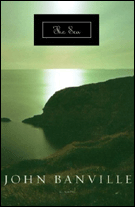The Sea (Man Booker Prize)
 Author: John Banville | Book description | Banville's magnificent new novel, which won this year's Man Booker Prize and is being rushed into print by Knopf, presents a man mourning his wife's recent death-and his blighted life. Max Mordan, beyond middle age, made sadly old by the long and painful death of his wife Anne, returns to the resort town of his childhood where he spent two weeks every summer with a father who would later desert them and a mother who could never forgive. Though not entirely clear, the seaside town seems to hover somewhere between England or Ireland. It is clannish self-serving and self-contained redolent with all vices of the fifties, sustained by prejudice: a caste system in which the inhabitants are divided between renters and owners, and those, who like the Graces, stayed in hotels and those like Max, who didn't. But who instead shared three shabby rooms, a chemical toilet and paraffin stove. While part of the novel deals with their relationship it also weaves in the relationship between the Grace twins: Chloe and Myles. The two gods Max envied and so desperately wanted to emulate. Years later, Max would return with his daughter Claire and a tearful scene concerning her own awkward relationships. Another time he would bring Anne. Therefore following her death is seems both natural and predictable that he would return. The Cedars rooming house as bereft and nondescript as ever but where Max had first met Grace family. This is what Max wants. What he needs to remember, and in time, relive. The place he has never forgotten, where one summer long ago he became part of a tribal and sexual initiation that had ended in tragedy. And where, another young woman, much like Max had never quite belonged either. Author introduction Banville's fictional portrait of the 15th-century Polish astronomer Dr Copernicus (1976) won the James Tait Black Memorial Prize (for fiction) and was the first in a series of books exploring the lives of eminent scientists and scientific ideas. The second novel in the series was about the 16th-century German astronomer Kepler (1981) and won the Guardian Fiction Prize. The Newton Letter: An Interlude (1982), is the story of an academic writing a book about the mathematician Sir Isaac Newton. It was adapted as a film by Channel 4 Television. Mefisto (1986), explores the world of numbers in a reworking of Dr Faustus. The Book of Evidence (1989), which won the Guinness Peat Aviation Book Award and was shortlisted for the Booker Prize for Fiction, Ghosts (1993) and Athena (1995) form a loose trilogy of novels narrated by Freddie Montgomery, a convicted murderer. The central character of Banville's 1997 novel, The Untouchable, Victor Maskell, is based on the art historian and spy Anthony Blunt. Eclipse (2000), is narrated by Alexander Cleave, an actor who has withdrawn to the house where he spent his childhood. Shroud (2002), continues the tale begun in Eclipse and Prague Pictures: Portrait of a City (2003), is a personal evocation of the magical European city. John Banville lives in Dublin. His latest book The Sea (2005) won the 2005 Man Booker Prize. In The Sea an elderly art historian loses his wife to cancer and feels compelled to revisit the seaside villa where he spent childhood holidays. |








